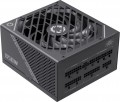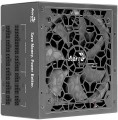Cooling system
—
Active cooling system. Uses a fan that constantly operates to remove heat from internal components. Unlike passive cooling, the active system provides better heat dissipation and stability under high loads, preventing overheating. However, it creates noise. To eliminate this, fans in such power supplies can have dynamic speed control (AFC – Automatic Fan Control), reducing speed at low power consumption.
—
Semi-passive. Active cooling systems with automatic fan shutdown in situations where the load on the power supply is low and heat generation is reduced. Let us remind you that systems of this type are more efficient than passive ones, but they consume additional energy and create noise during operation. Accordingly, at low loads, when intensive cooling is not required, it is wiser to turn off the fans — this saves energy and reduces the noise level.
—
Passive(radiators). Compared to fans, radiators have a number of advantages: for example, they do not create any noise and do not require their own power supply (thus reducing overall energy consumption). On the other hand, they are significantly less efficient, as a result — the power of power supplies with passive cooling does not exceed 600 W. In addition, such power supplies are quite expensive.
Fan size
The diameter of the fan(s) in the power supply cooling system.
The large diameter allows to achieve good efficiency at relatively low RPMs, which in turn reduces noise and power consumption. On the other hand, large fans are more expensive than small ones and take up a lot of space, which affects the dimensions of the entire PSU. We also emphasize that a small fan is not yet a sign of a cheap power supply — quite advanced models can also have such equipment, in order to reduce dimensions.
As for specific diameters, the smallest value that can be found in modern consumer-grade PSUs is
80 mm. The most popular option is
120 mm, this size gives good efficiency and a relatively low noise level at a reasonable price and dimensions. Larger diameters are somewhat less common —
135 mm and
140 mm.
Fan bearing
The bearing is the piece between the rotating axle of the fan and the fixed base that supports the axle and reduces friction. The following types of bearings are found in modern fans:
— Sliding. The action of these bearings is based on direct contact between two solid surfaces, carefully polished to reduce friction. Such devices are simple, reliable and durable, but their efficiency is quite low — rolling, and even more so the hydrodynamic and magnetic principle of operation, provide much less friction.
— Rolling. They are also called "ball bearings", since the "mediators" between the axis of rotation and the fixed base are balls (less often — cylindrical rollers) fixed in a special ring. When the axis rotates, such balls roll between it and the base, due to which the friction force is very low — noticeably lower than in plain bearings. On the other hand, the design turns out to be more expensive and complex, and in terms of reliability it is somewhat inferior to both the same plain bearings and more advanced hydrodynamic devices. Therefore, although rolling bearings are quite widespread nowadays, however, in general, they are much less common than the mentioned varieties.
— Hydrodynamic. Bearings of this type are filled with a special liquid; when rotated, it creates a layer on which the moving part of the bearing slides. In this way, direct contact between hard surfaces is avoided and friction is significantly reduced compared to previous...types. Also, these bearings are quiet and very reliable. Of their shortcomings, a relatively high cost can be noted, but in fact this moment often turns out to be invisible against the background of the price of the entire system. Therefore, this option is extremely popular nowadays, it can be found in cooling systems of all levels — from low-cost to advanced.
— Magnetic centering. Bearings based on the principle of magnetic levitation: the rotating axis is "suspended" in a magnetic field. Thus, it is possible (as in hydrodynamic ones) to avoid contact between solid surfaces and further reduce friction. Considered the most advanced type of bearings, they are reliable and quiet, but expensive.
Certification
The presence or absence of an 80+ certificate for the power supply. This certificate indicates high energy efficiency: to obtain it, the efficiency (see above) must be at least 80%, and in different modes (20%, 50% and 100% of the maximum load). There are several degrees of 80+:
—
80+. The original version of the certificate, assuming an efficiency of at least 82% (at least 85% for 50% load).
—
80+ White. The second name of the original 80+ certificate (see above).
—
80+ Bronze — efficiency not less than 85% (for half load — 88%).
—
80+ Silver — respectively 87% (90% for half load).
—
80+ Gold — 89% (92% for half load)
—
80+ Platinum — 90% (94% for half load).
—
80+ Titanium — 94% (96% for half load).
The power factor (see "PFC Type") must be at least 0.9 for the lower levels and at least 0.95 for the Platinum level. Also note that for redundant power used in server systems, the efficiency requirements are somewhat lower.
ATX12V version
A standard for power supplies that supplements the ATX specifications regarding power supply along the 12 V line. Introduced into use since the time of the Intel Pentium 4 processor. In the first series of the standard, the +5 V line was mainly used; from version 2.0, the +12 V line was introduced to fully power the components computer. Also in the second generation, a 24-pin power connector appeared, used in most modern motherboards.
MOLEX
The number of Molex (IDE) connectors provided in the design of the power supply.
Initially, such a connector was intended to power peripherals for the IDE interface, primarily hard drives. And although the IDE itself is completely obsolete today and is not used in new components, however, the Molex power connector continues to be installed in power supplies, and almost without fail. Almost any modern PSU has at least
1 – 2 of these connectors, and in high-end models this number can be
7 or more. This situation is due to the fact that Molex IDE is a fairly universal standard, and with the help of the simplest adapters, components with a different power interface can be powered from it. For example, there are Molex - SATA adapters for drives, Molex - 6 pin for video cards, etc.
PCI-E 8pin
The number of 8-pin (8pin) PCI-E power connectors provided in the power supply. We emphasize that in this case we are talking about ordinary connectors of this type, working only in the 8pin format; the number of combined 8pin (6+2) plugs is specified separately (see below).
Additional PCI-E power connectors are used to additionally power those types of internal peripherals for which 75 W is no longer enough, supplied directly through the PCI-E socket on the motherboard (video cards are a typical example). The 8-pin connector on the power supply additionally provides another 150 W — thus, when using this connector, it becomes possible to connect boards with a power consumption of up to 225 W. At the same time, some power supplies can be equipped with several PCI-E power plugs at once — based on powerful video cards that have several external power connectors, or on several separate video cards. However, it is worth noting that the classic PCI-E 8pin is rare nowadays — the more convenient and versatile PCI-E 8pin (6 + 2) has become more widespread. See below for more details.
PCI-E 16pin
the 16-pin PCI-E power connector is designed to replace the existing 8-pin counterparts. It consists of twelve lines for current supply and four more for data transmission. The connector provides up to 600 W of additional power, which is a fourfold increase in power compared to 8-pin versions of the interface. Additional PCI-E connectors of all formats are used to power those types of internal peripherals that are no longer enough with 75 W supplied directly through the PCI-E socket on the motherboard.
+12V1
The maximum current that the PSU is capable of delivering to the first power line is + 12V.
For more information about power lines in general, see "+3.3V". Here it is worth mentioning that 12 V is the most popular voltage among computer power connectors. It is used in almost all such connectors (with a few exceptions), and some plugs (for example, additional PCI-E power for 6 or 8 connectors) use only 12-volt lines — and in the + 12V format. And the division of + 12V power into several separate lines is used for safety purposes — in order to reduce the current flowing through each individual wire, and thus prevent excessive load and overheating of the wiring. However, some manufacturers do not specify the maximum current for individual + 12V lines and give only a general value in the characteristics; in such cases, this number is indicated in this paragraph.

